UNCC 300: Analyzing Torture through Common Good & CST Principles
VerifiedAdded on 2023/06/10
|8
|2020
|141
Essay
AI Summary
This essay reflects on the challenges posed by torture to the common good, both locally and globally, drawing upon the principles of Catholic Social Teaching (CST). It argues that torture negates the common good by violating individual rights and human dignity. The essay proposes addressing this challenge through advocacy, emphasizing the life and dignity of human beings, their rights and responsibilities, and care for God's creation. It also highlights the role of international organizations in rehabilitating prisoners and promoting their reintegration into society. The essay concludes by underscoring the importance of upholding CST principles to achieve a more just and equitable community, advocating for the protection of vulnerable members of society and the promotion of human dignity for all. Desklib offers a wide range of resources, including similar essays and solved assignments, to aid students in their studies.
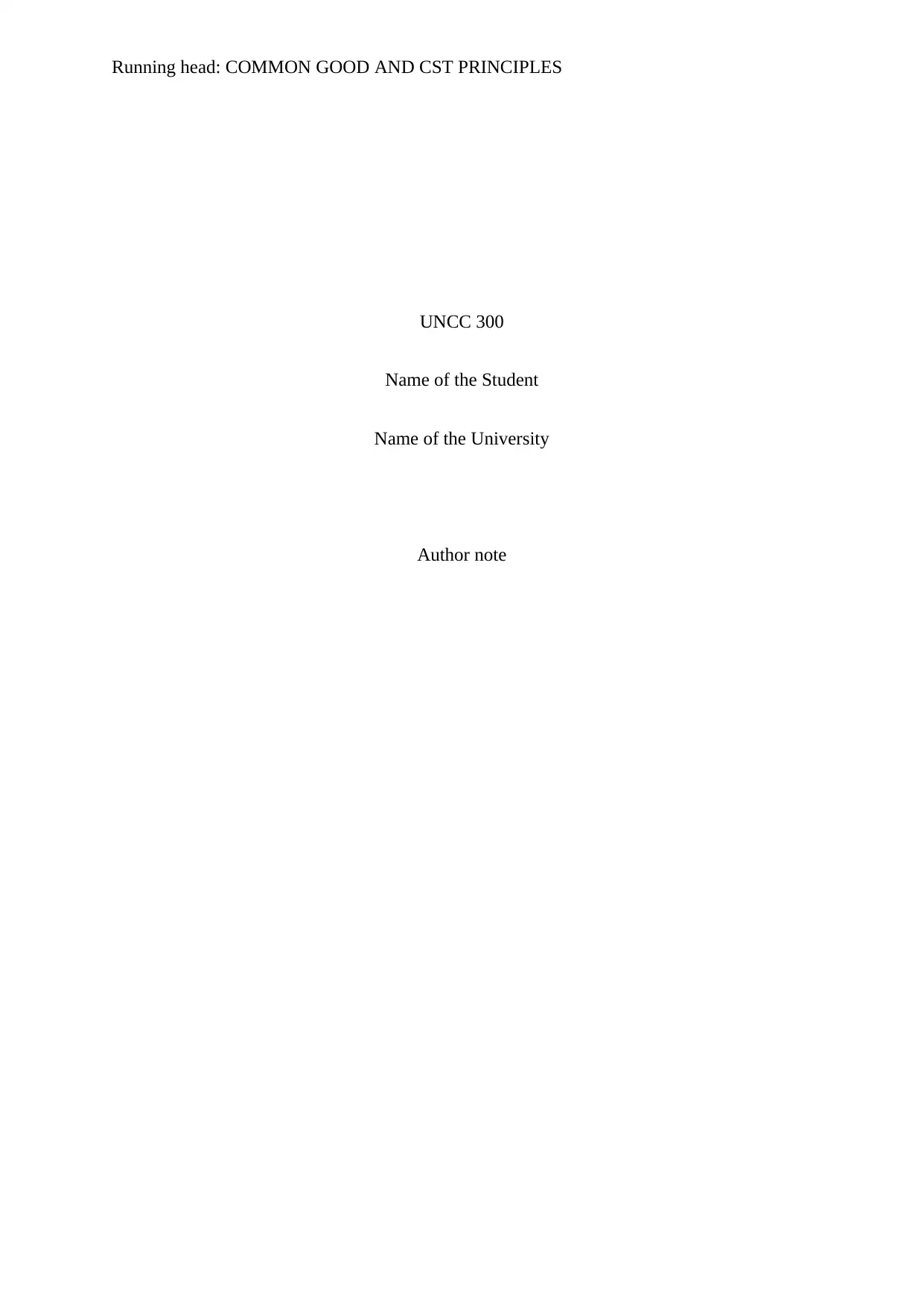
Running head: COMMON GOOD AND CST PRINCIPLES
UNCC 300
Name of the Student
Name of the University
Author note
UNCC 300
Name of the Student
Name of the University
Author note
Paraphrase This Document
Need a fresh take? Get an instant paraphrase of this document with our AI Paraphraser
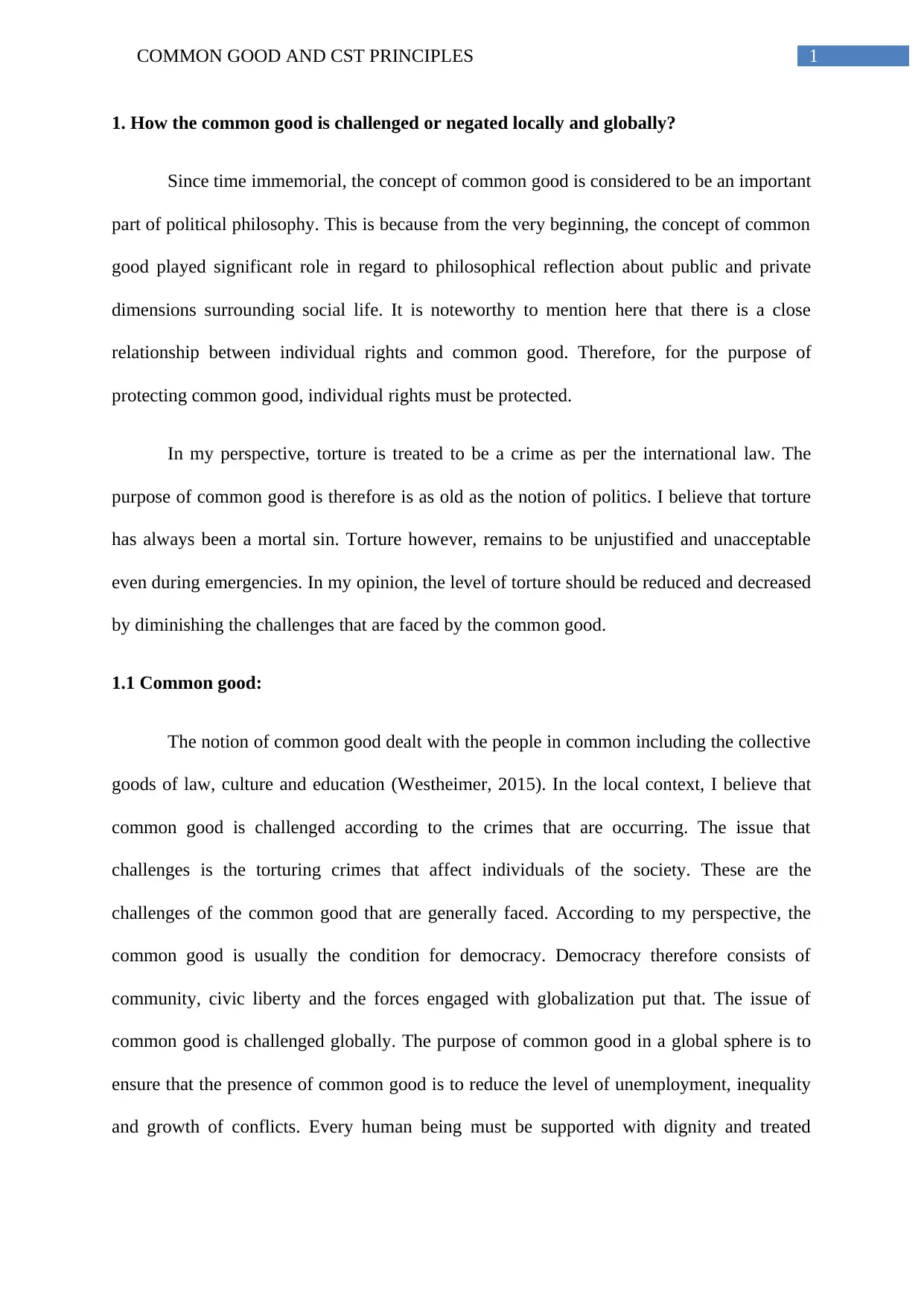
1COMMON GOOD AND CST PRINCIPLES
1. How the common good is challenged or negated locally and globally?
Since time immemorial, the concept of common good is considered to be an important
part of political philosophy. This is because from the very beginning, the concept of common
good played significant role in regard to philosophical reflection about public and private
dimensions surrounding social life. It is noteworthy to mention here that there is a close
relationship between individual rights and common good. Therefore, for the purpose of
protecting common good, individual rights must be protected.
In my perspective, torture is treated to be a crime as per the international law. The
purpose of common good is therefore is as old as the notion of politics. I believe that torture
has always been a mortal sin. Torture however, remains to be unjustified and unacceptable
even during emergencies. In my opinion, the level of torture should be reduced and decreased
by diminishing the challenges that are faced by the common good.
1.1 Common good:
The notion of common good dealt with the people in common including the collective
goods of law, culture and education (Westheimer, 2015). In the local context, I believe that
common good is challenged according to the crimes that are occurring. The issue that
challenges is the torturing crimes that affect individuals of the society. These are the
challenges of the common good that are generally faced. According to my perspective, the
common good is usually the condition for democracy. Democracy therefore consists of
community, civic liberty and the forces engaged with globalization put that. The issue of
common good is challenged globally. The purpose of common good in a global sphere is to
ensure that the presence of common good is to reduce the level of unemployment, inequality
and growth of conflicts. Every human being must be supported with dignity and treated
1. How the common good is challenged or negated locally and globally?
Since time immemorial, the concept of common good is considered to be an important
part of political philosophy. This is because from the very beginning, the concept of common
good played significant role in regard to philosophical reflection about public and private
dimensions surrounding social life. It is noteworthy to mention here that there is a close
relationship between individual rights and common good. Therefore, for the purpose of
protecting common good, individual rights must be protected.
In my perspective, torture is treated to be a crime as per the international law. The
purpose of common good is therefore is as old as the notion of politics. I believe that torture
has always been a mortal sin. Torture however, remains to be unjustified and unacceptable
even during emergencies. In my opinion, the level of torture should be reduced and decreased
by diminishing the challenges that are faced by the common good.
1.1 Common good:
The notion of common good dealt with the people in common including the collective
goods of law, culture and education (Westheimer, 2015). In the local context, I believe that
common good is challenged according to the crimes that are occurring. The issue that
challenges is the torturing crimes that affect individuals of the society. These are the
challenges of the common good that are generally faced. According to my perspective, the
common good is usually the condition for democracy. Democracy therefore consists of
community, civic liberty and the forces engaged with globalization put that. The issue of
common good is challenged globally. The purpose of common good in a global sphere is to
ensure that the presence of common good is to reduce the level of unemployment, inequality
and growth of conflicts. Every human being must be supported with dignity and treated
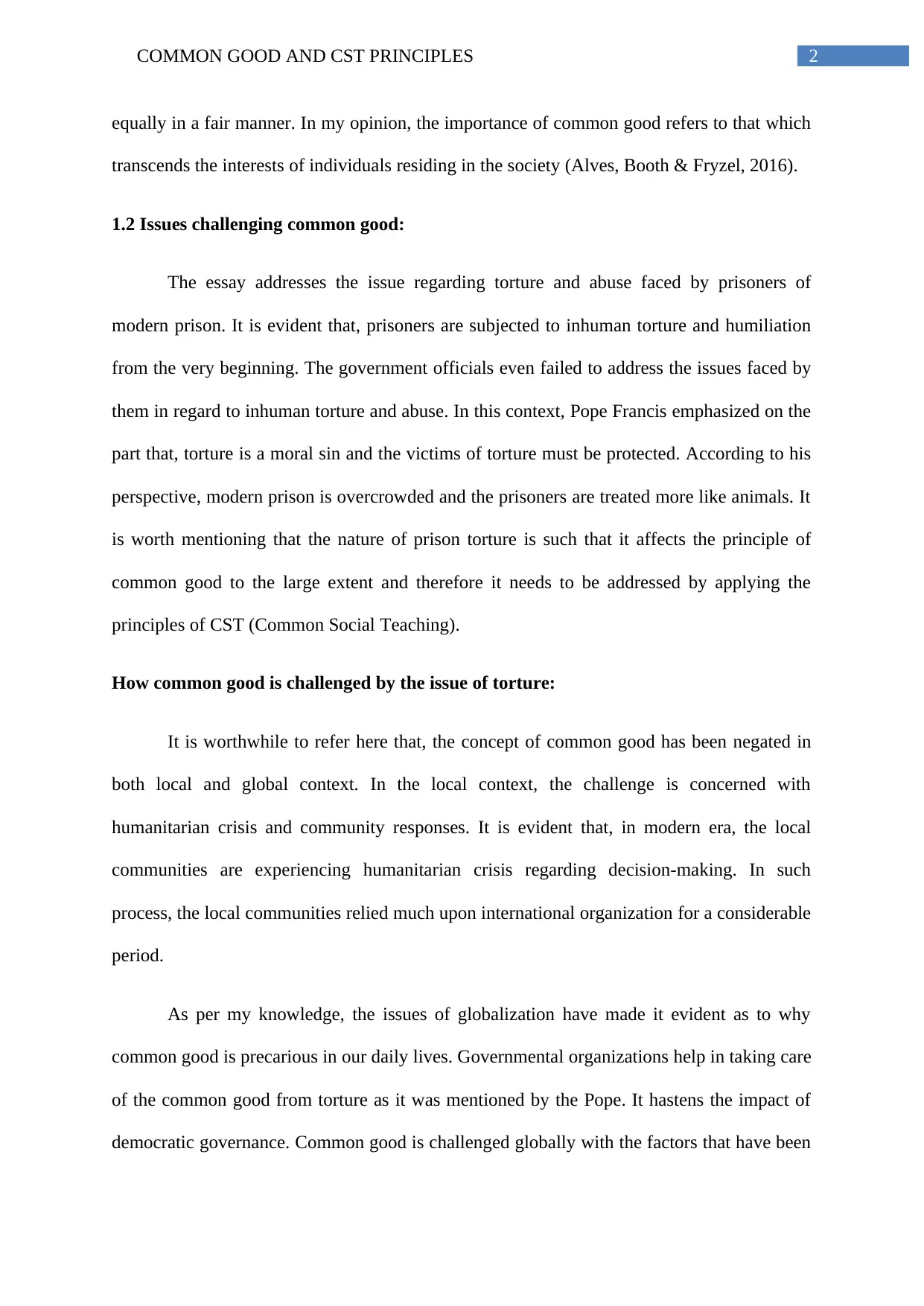
2COMMON GOOD AND CST PRINCIPLES
equally in a fair manner. In my opinion, the importance of common good refers to that which
transcends the interests of individuals residing in the society (Alves, Booth & Fryzel, 2016).
1.2 Issues challenging common good:
The essay addresses the issue regarding torture and abuse faced by prisoners of
modern prison. It is evident that, prisoners are subjected to inhuman torture and humiliation
from the very beginning. The government officials even failed to address the issues faced by
them in regard to inhuman torture and abuse. In this context, Pope Francis emphasized on the
part that, torture is a moral sin and the victims of torture must be protected. According to his
perspective, modern prison is overcrowded and the prisoners are treated more like animals. It
is worth mentioning that the nature of prison torture is such that it affects the principle of
common good to the large extent and therefore it needs to be addressed by applying the
principles of CST (Common Social Teaching).
How common good is challenged by the issue of torture:
It is worthwhile to refer here that, the concept of common good has been negated in
both local and global context. In the local context, the challenge is concerned with
humanitarian crisis and community responses. It is evident that, in modern era, the local
communities are experiencing humanitarian crisis regarding decision-making. In such
process, the local communities relied much upon international organization for a considerable
period.
As per my knowledge, the issues of globalization have made it evident as to why
common good is precarious in our daily lives. Governmental organizations help in taking care
of the common good from torture as it was mentioned by the Pope. It hastens the impact of
democratic governance. Common good is challenged globally with the factors that have been
equally in a fair manner. In my opinion, the importance of common good refers to that which
transcends the interests of individuals residing in the society (Alves, Booth & Fryzel, 2016).
1.2 Issues challenging common good:
The essay addresses the issue regarding torture and abuse faced by prisoners of
modern prison. It is evident that, prisoners are subjected to inhuman torture and humiliation
from the very beginning. The government officials even failed to address the issues faced by
them in regard to inhuman torture and abuse. In this context, Pope Francis emphasized on the
part that, torture is a moral sin and the victims of torture must be protected. According to his
perspective, modern prison is overcrowded and the prisoners are treated more like animals. It
is worth mentioning that the nature of prison torture is such that it affects the principle of
common good to the large extent and therefore it needs to be addressed by applying the
principles of CST (Common Social Teaching).
How common good is challenged by the issue of torture:
It is worthwhile to refer here that, the concept of common good has been negated in
both local and global context. In the local context, the challenge is concerned with
humanitarian crisis and community responses. It is evident that, in modern era, the local
communities are experiencing humanitarian crisis regarding decision-making. In such
process, the local communities relied much upon international organization for a considerable
period.
As per my knowledge, the issues of globalization have made it evident as to why
common good is precarious in our daily lives. Governmental organizations help in taking care
of the common good from torture as it was mentioned by the Pope. It hastens the impact of
democratic governance. Common good is challenged globally with the factors that have been
⊘ This is a preview!⊘
Do you want full access?
Subscribe today to unlock all pages.

Trusted by 1+ million students worldwide
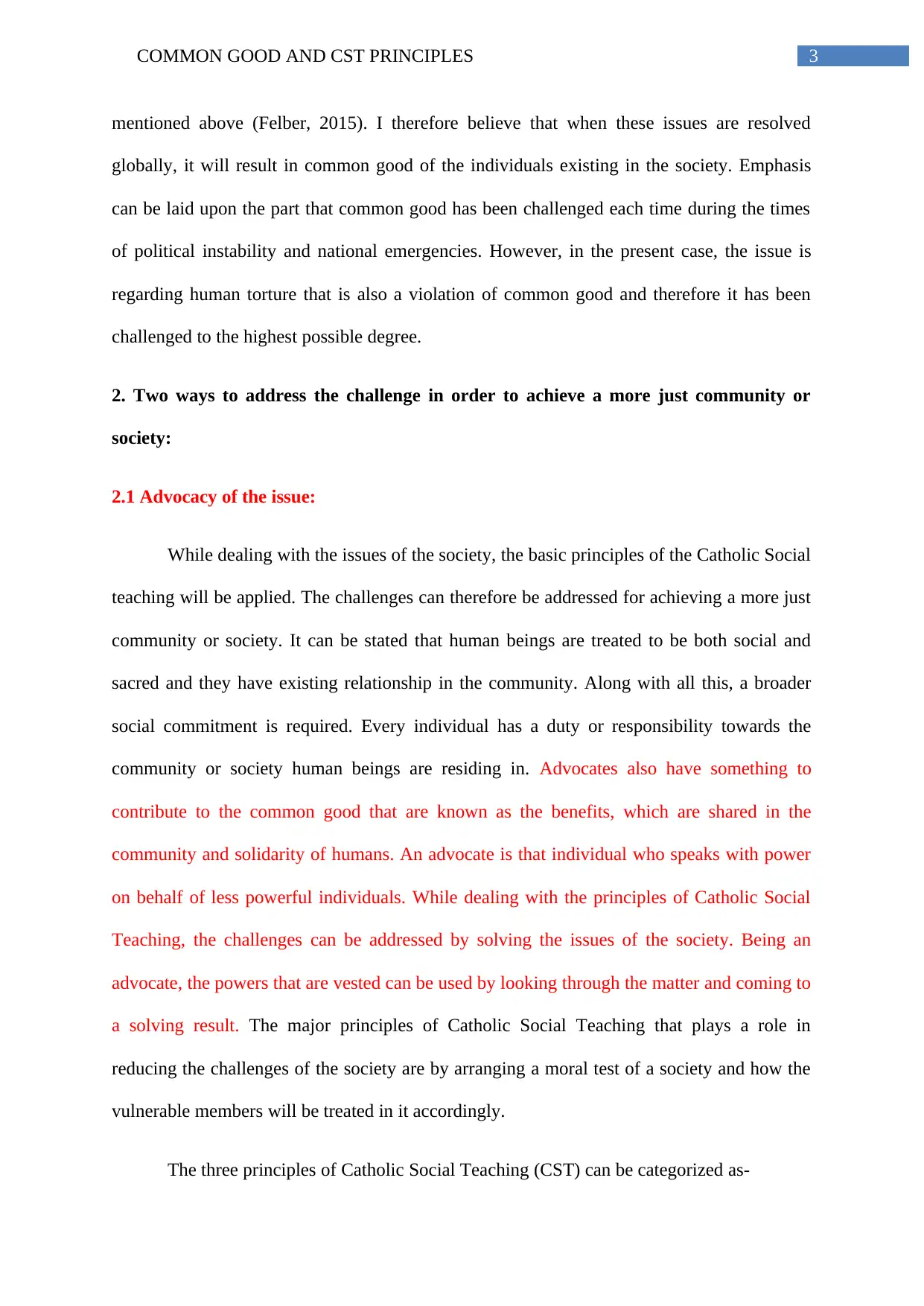
3COMMON GOOD AND CST PRINCIPLES
mentioned above (Felber, 2015). I therefore believe that when these issues are resolved
globally, it will result in common good of the individuals existing in the society. Emphasis
can be laid upon the part that common good has been challenged each time during the times
of political instability and national emergencies. However, in the present case, the issue is
regarding human torture that is also a violation of common good and therefore it has been
challenged to the highest possible degree.
2. Two ways to address the challenge in order to achieve a more just community or
society:
2.1 Advocacy of the issue:
While dealing with the issues of the society, the basic principles of the Catholic Social
teaching will be applied. The challenges can therefore be addressed for achieving a more just
community or society. It can be stated that human beings are treated to be both social and
sacred and they have existing relationship in the community. Along with all this, a broader
social commitment is required. Every individual has a duty or responsibility towards the
community or society human beings are residing in. Advocates also have something to
contribute to the common good that are known as the benefits, which are shared in the
community and solidarity of humans. An advocate is that individual who speaks with power
on behalf of less powerful individuals. While dealing with the principles of Catholic Social
Teaching, the challenges can be addressed by solving the issues of the society. Being an
advocate, the powers that are vested can be used by looking through the matter and coming to
a solving result. The major principles of Catholic Social Teaching that plays a role in
reducing the challenges of the society are by arranging a moral test of a society and how the
vulnerable members will be treated in it accordingly.
The three principles of Catholic Social Teaching (CST) can be categorized as-
mentioned above (Felber, 2015). I therefore believe that when these issues are resolved
globally, it will result in common good of the individuals existing in the society. Emphasis
can be laid upon the part that common good has been challenged each time during the times
of political instability and national emergencies. However, in the present case, the issue is
regarding human torture that is also a violation of common good and therefore it has been
challenged to the highest possible degree.
2. Two ways to address the challenge in order to achieve a more just community or
society:
2.1 Advocacy of the issue:
While dealing with the issues of the society, the basic principles of the Catholic Social
teaching will be applied. The challenges can therefore be addressed for achieving a more just
community or society. It can be stated that human beings are treated to be both social and
sacred and they have existing relationship in the community. Along with all this, a broader
social commitment is required. Every individual has a duty or responsibility towards the
community or society human beings are residing in. Advocates also have something to
contribute to the common good that are known as the benefits, which are shared in the
community and solidarity of humans. An advocate is that individual who speaks with power
on behalf of less powerful individuals. While dealing with the principles of Catholic Social
Teaching, the challenges can be addressed by solving the issues of the society. Being an
advocate, the powers that are vested can be used by looking through the matter and coming to
a solving result. The major principles of Catholic Social Teaching that plays a role in
reducing the challenges of the society are by arranging a moral test of a society and how the
vulnerable members will be treated in it accordingly.
The three principles of Catholic Social Teaching (CST) can be categorized as-
Paraphrase This Document
Need a fresh take? Get an instant paraphrase of this document with our AI Paraphraser
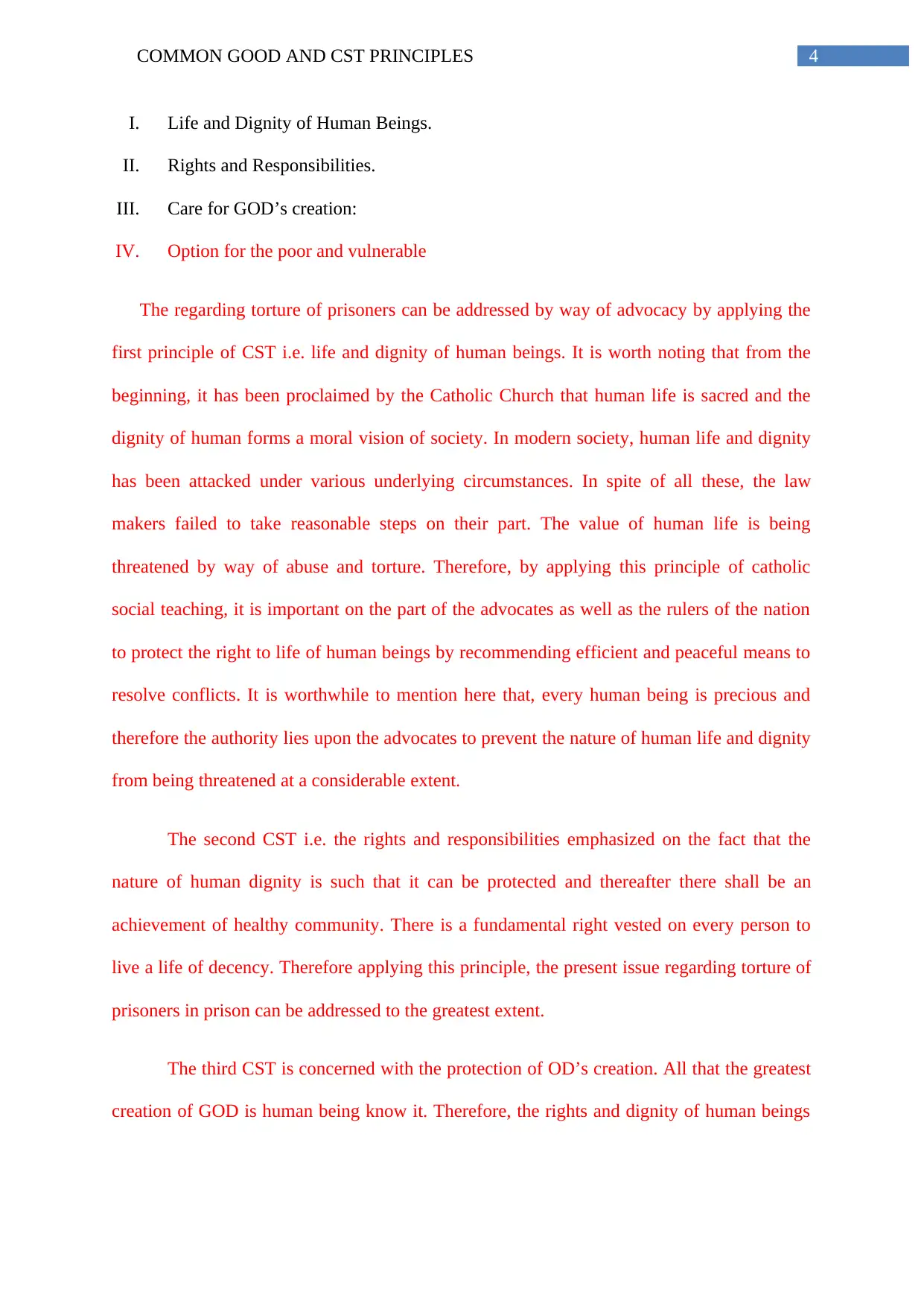
4COMMON GOOD AND CST PRINCIPLES
I. Life and Dignity of Human Beings.
II. Rights and Responsibilities.
III. Care for GOD’s creation:
IV. Option for the poor and vulnerable
The regarding torture of prisoners can be addressed by way of advocacy by applying the
first principle of CST i.e. life and dignity of human beings. It is worth noting that from the
beginning, it has been proclaimed by the Catholic Church that human life is sacred and the
dignity of human forms a moral vision of society. In modern society, human life and dignity
has been attacked under various underlying circumstances. In spite of all these, the law
makers failed to take reasonable steps on their part. The value of human life is being
threatened by way of abuse and torture. Therefore, by applying this principle of catholic
social teaching, it is important on the part of the advocates as well as the rulers of the nation
to protect the right to life of human beings by recommending efficient and peaceful means to
resolve conflicts. It is worthwhile to mention here that, every human being is precious and
therefore the authority lies upon the advocates to prevent the nature of human life and dignity
from being threatened at a considerable extent.
The second CST i.e. the rights and responsibilities emphasized on the fact that the
nature of human dignity is such that it can be protected and thereafter there shall be an
achievement of healthy community. There is a fundamental right vested on every person to
live a life of decency. Therefore applying this principle, the present issue regarding torture of
prisoners in prison can be addressed to the greatest extent.
The third CST is concerned with the protection of OD’s creation. All that the greatest
creation of GOD is human being know it. Therefore, the rights and dignity of human beings
I. Life and Dignity of Human Beings.
II. Rights and Responsibilities.
III. Care for GOD’s creation:
IV. Option for the poor and vulnerable
The regarding torture of prisoners can be addressed by way of advocacy by applying the
first principle of CST i.e. life and dignity of human beings. It is worth noting that from the
beginning, it has been proclaimed by the Catholic Church that human life is sacred and the
dignity of human forms a moral vision of society. In modern society, human life and dignity
has been attacked under various underlying circumstances. In spite of all these, the law
makers failed to take reasonable steps on their part. The value of human life is being
threatened by way of abuse and torture. Therefore, by applying this principle of catholic
social teaching, it is important on the part of the advocates as well as the rulers of the nation
to protect the right to life of human beings by recommending efficient and peaceful means to
resolve conflicts. It is worthwhile to mention here that, every human being is precious and
therefore the authority lies upon the advocates to prevent the nature of human life and dignity
from being threatened at a considerable extent.
The second CST i.e. the rights and responsibilities emphasized on the fact that the
nature of human dignity is such that it can be protected and thereafter there shall be an
achievement of healthy community. There is a fundamental right vested on every person to
live a life of decency. Therefore applying this principle, the present issue regarding torture of
prisoners in prison can be addressed to the greatest extent.
The third CST is concerned with the protection of OD’s creation. All that the greatest
creation of GOD is human being know it. Therefore, the rights and dignity of human beings
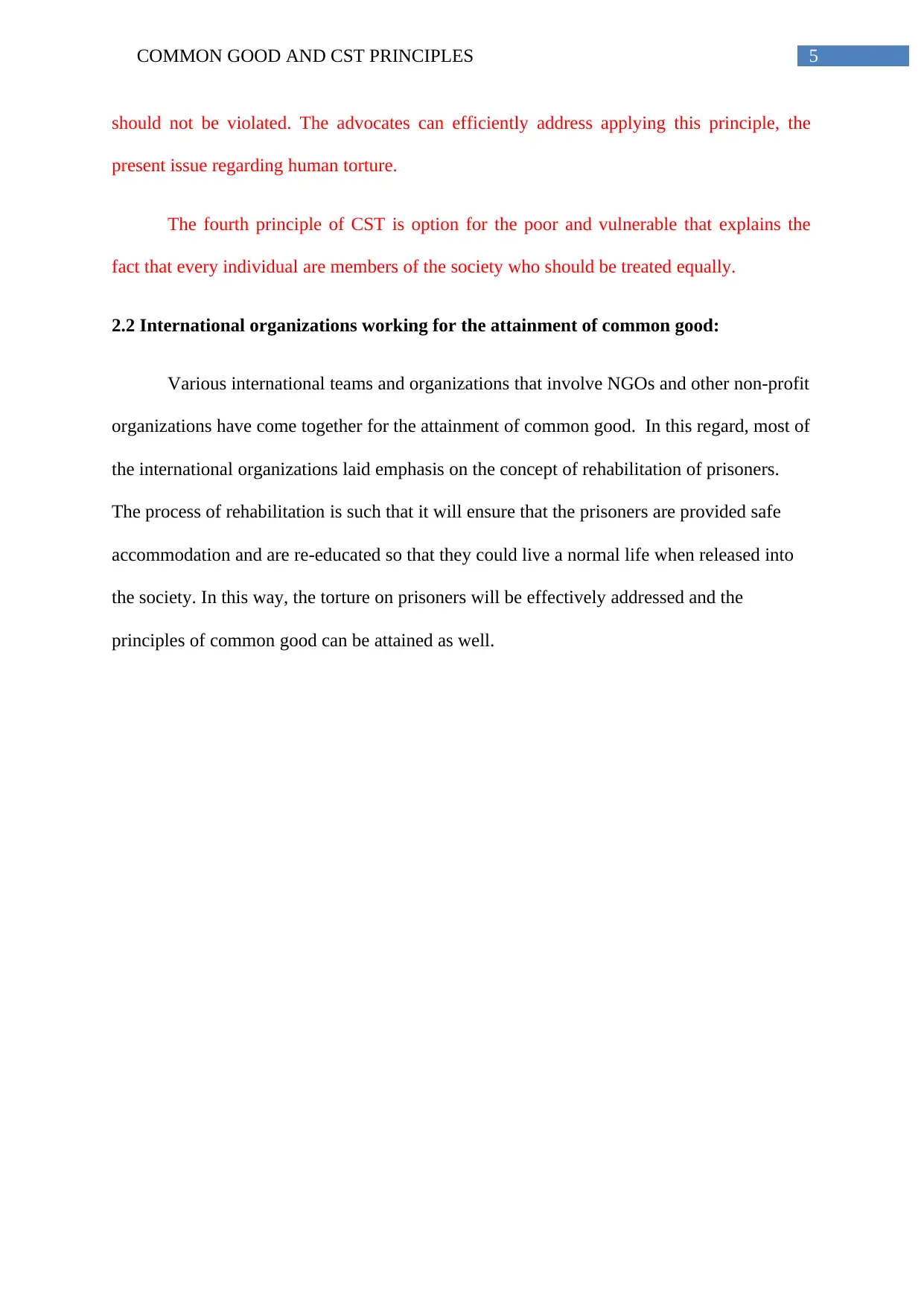
5COMMON GOOD AND CST PRINCIPLES
should not be violated. The advocates can efficiently address applying this principle, the
present issue regarding human torture.
The fourth principle of CST is option for the poor and vulnerable that explains the
fact that every individual are members of the society who should be treated equally.
2.2 International organizations working for the attainment of common good:
Various international teams and organizations that involve NGOs and other non-profit
organizations have come together for the attainment of common good. In this regard, most of
the international organizations laid emphasis on the concept of rehabilitation of prisoners.
The process of rehabilitation is such that it will ensure that the prisoners are provided safe
accommodation and are re-educated so that they could live a normal life when released into
the society. In this way, the torture on prisoners will be effectively addressed and the
principles of common good can be attained as well.
should not be violated. The advocates can efficiently address applying this principle, the
present issue regarding human torture.
The fourth principle of CST is option for the poor and vulnerable that explains the
fact that every individual are members of the society who should be treated equally.
2.2 International organizations working for the attainment of common good:
Various international teams and organizations that involve NGOs and other non-profit
organizations have come together for the attainment of common good. In this regard, most of
the international organizations laid emphasis on the concept of rehabilitation of prisoners.
The process of rehabilitation is such that it will ensure that the prisoners are provided safe
accommodation and are re-educated so that they could live a normal life when released into
the society. In this way, the torture on prisoners will be effectively addressed and the
principles of common good can be attained as well.
⊘ This is a preview!⊘
Do you want full access?
Subscribe today to unlock all pages.

Trusted by 1+ million students worldwide
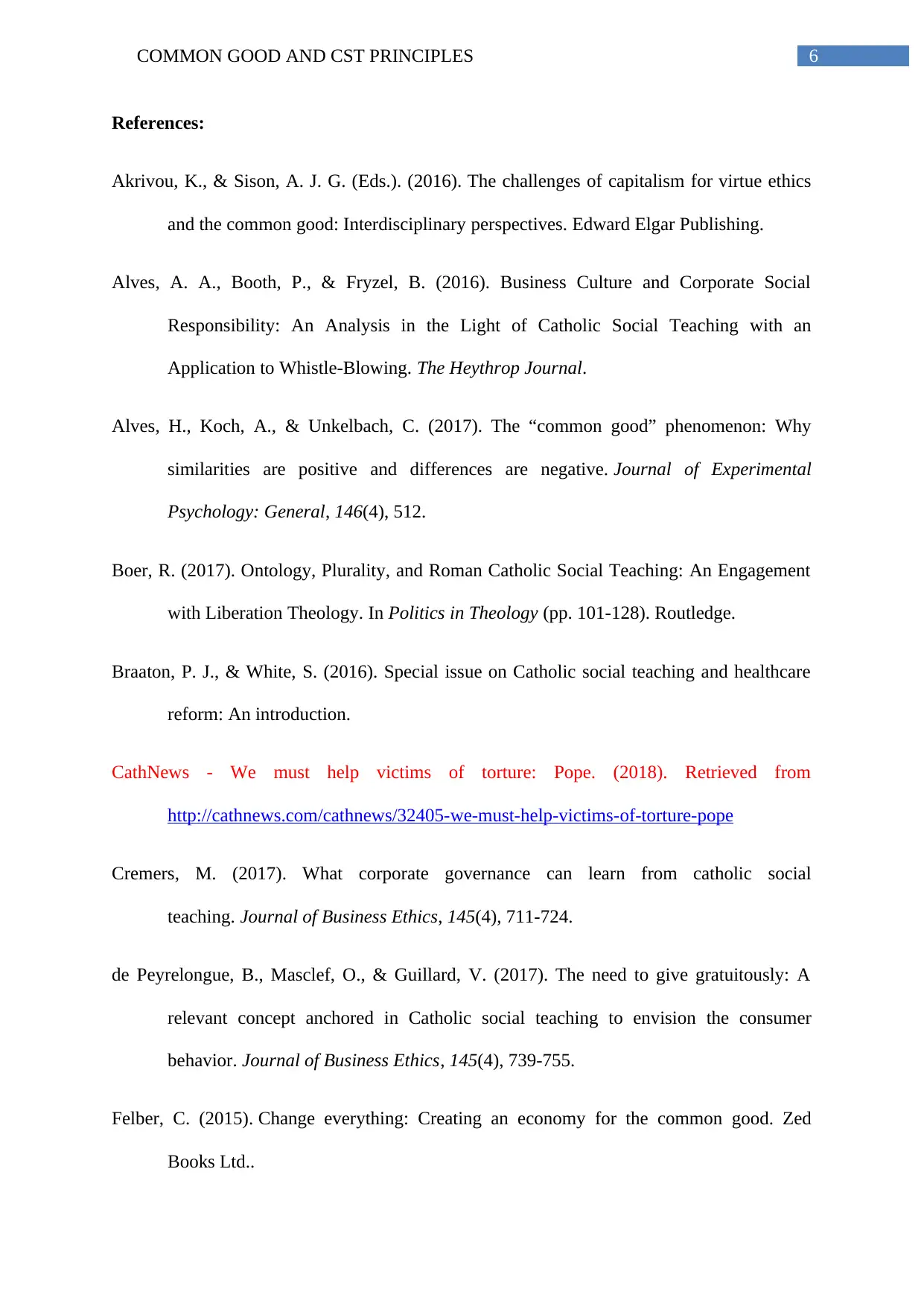
6COMMON GOOD AND CST PRINCIPLES
References:
Akrivou, K., & Sison, A. J. G. (Eds.). (2016). The challenges of capitalism for virtue ethics
and the common good: Interdisciplinary perspectives. Edward Elgar Publishing.
Alves, A. A., Booth, P., & Fryzel, B. (2016). Business Culture and Corporate Social
Responsibility: An Analysis in the Light of Catholic Social Teaching with an
Application to Whistle‐Blowing. The Heythrop Journal.
Alves, H., Koch, A., & Unkelbach, C. (2017). The “common good” phenomenon: Why
similarities are positive and differences are negative. Journal of Experimental
Psychology: General, 146(4), 512.
Boer, R. (2017). Ontology, Plurality, and Roman Catholic Social Teaching: An Engagement
with Liberation Theology. In Politics in Theology (pp. 101-128). Routledge.
Braaton, P. J., & White, S. (2016). Special issue on Catholic social teaching and healthcare
reform: An introduction.
CathNews - We must help victims of torture: Pope. (2018). Retrieved from
http://cathnews.com/cathnews/32405-we-must-help-victims-of-torture-pope
Cremers, M. (2017). What corporate governance can learn from catholic social
teaching. Journal of Business Ethics, 145(4), 711-724.
de Peyrelongue, B., Masclef, O., & Guillard, V. (2017). The need to give gratuitously: A
relevant concept anchored in Catholic social teaching to envision the consumer
behavior. Journal of Business Ethics, 145(4), 739-755.
Felber, C. (2015). Change everything: Creating an economy for the common good. Zed
Books Ltd..
References:
Akrivou, K., & Sison, A. J. G. (Eds.). (2016). The challenges of capitalism for virtue ethics
and the common good: Interdisciplinary perspectives. Edward Elgar Publishing.
Alves, A. A., Booth, P., & Fryzel, B. (2016). Business Culture and Corporate Social
Responsibility: An Analysis in the Light of Catholic Social Teaching with an
Application to Whistle‐Blowing. The Heythrop Journal.
Alves, H., Koch, A., & Unkelbach, C. (2017). The “common good” phenomenon: Why
similarities are positive and differences are negative. Journal of Experimental
Psychology: General, 146(4), 512.
Boer, R. (2017). Ontology, Plurality, and Roman Catholic Social Teaching: An Engagement
with Liberation Theology. In Politics in Theology (pp. 101-128). Routledge.
Braaton, P. J., & White, S. (2016). Special issue on Catholic social teaching and healthcare
reform: An introduction.
CathNews - We must help victims of torture: Pope. (2018). Retrieved from
http://cathnews.com/cathnews/32405-we-must-help-victims-of-torture-pope
Cremers, M. (2017). What corporate governance can learn from catholic social
teaching. Journal of Business Ethics, 145(4), 711-724.
de Peyrelongue, B., Masclef, O., & Guillard, V. (2017). The need to give gratuitously: A
relevant concept anchored in Catholic social teaching to envision the consumer
behavior. Journal of Business Ethics, 145(4), 739-755.
Felber, C. (2015). Change everything: Creating an economy for the common good. Zed
Books Ltd..
Paraphrase This Document
Need a fresh take? Get an instant paraphrase of this document with our AI Paraphraser
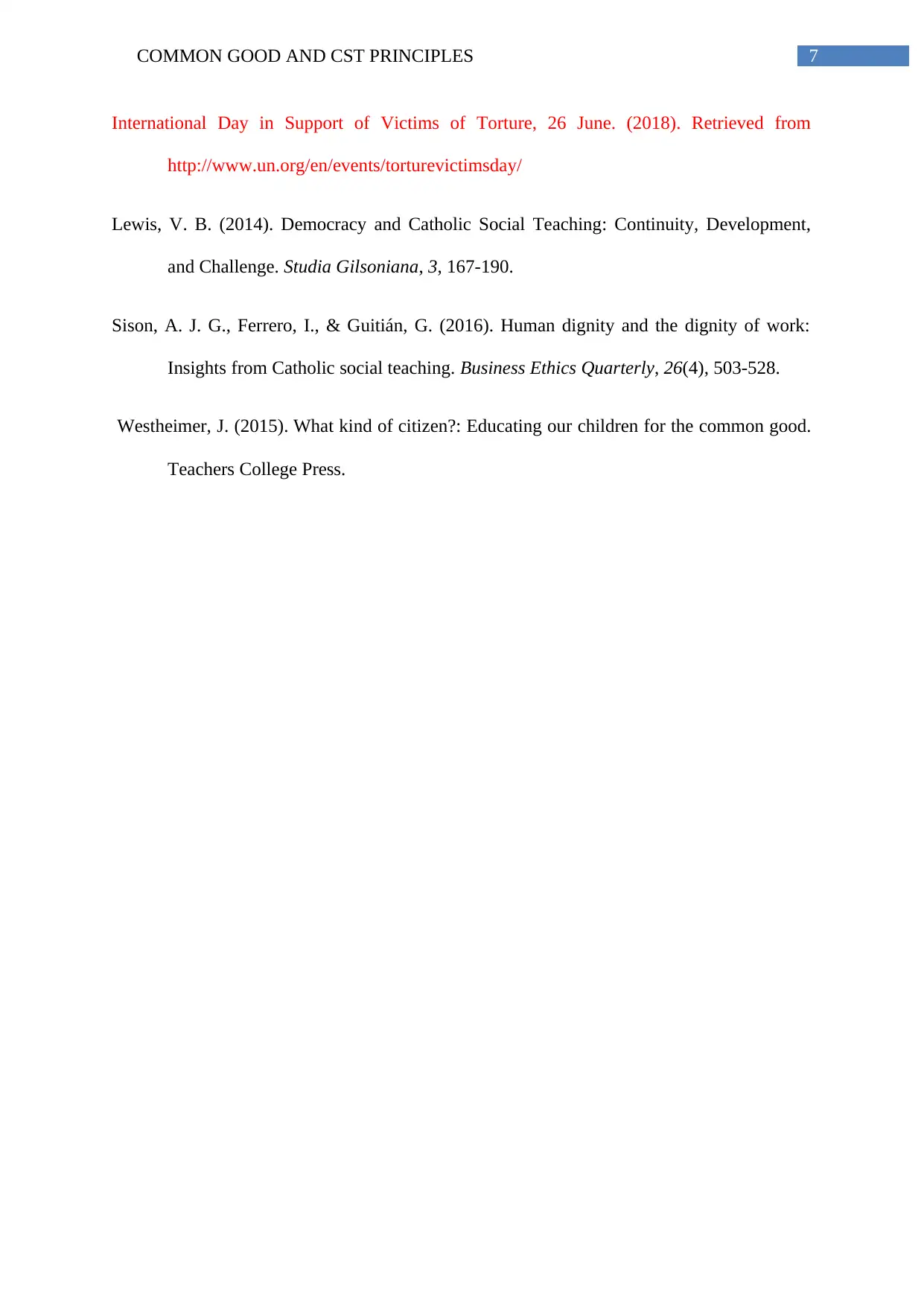
7COMMON GOOD AND CST PRINCIPLES
International Day in Support of Victims of Torture, 26 June. (2018). Retrieved from
http://www.un.org/en/events/torturevictimsday/
Lewis, V. B. (2014). Democracy and Catholic Social Teaching: Continuity, Development,
and Challenge. Studia Gilsoniana, 3, 167-190.
Sison, A. J. G., Ferrero, I., & Guitián, G. (2016). Human dignity and the dignity of work:
Insights from Catholic social teaching. Business Ethics Quarterly, 26(4), 503-528.
Westheimer, J. (2015). What kind of citizen?: Educating our children for the common good.
Teachers College Press.
International Day in Support of Victims of Torture, 26 June. (2018). Retrieved from
http://www.un.org/en/events/torturevictimsday/
Lewis, V. B. (2014). Democracy and Catholic Social Teaching: Continuity, Development,
and Challenge. Studia Gilsoniana, 3, 167-190.
Sison, A. J. G., Ferrero, I., & Guitián, G. (2016). Human dignity and the dignity of work:
Insights from Catholic social teaching. Business Ethics Quarterly, 26(4), 503-528.
Westheimer, J. (2015). What kind of citizen?: Educating our children for the common good.
Teachers College Press.
1 out of 8
Related Documents
Your All-in-One AI-Powered Toolkit for Academic Success.
+13062052269
info@desklib.com
Available 24*7 on WhatsApp / Email
![[object Object]](/_next/static/media/star-bottom.7253800d.svg)
Unlock your academic potential
Copyright © 2020–2025 A2Z Services. All Rights Reserved. Developed and managed by ZUCOL.





